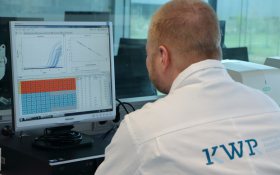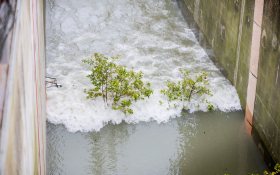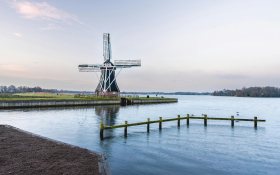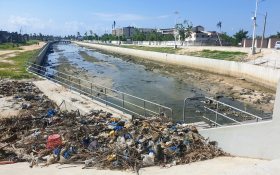
Improving water efficiency for sustainable sugar production in Egypt and India
Sugarcane is the main source of sugar in Egypt and India. Holding a prominent position as a cash crop, its cultivation predominantly relies on flood irrigation. Given Egypt’s and India’s Governments' preference for sustainable farming practices, Dutch organisations Delphy and IrriWatch joined forces with TAMKEEN Group in Egypt and DCM Shriram Ltd in India to evaluate the resource requirements for sugarcane versus sugar beet cultivation while determining and validating the water footprint and cost-benefit analysis.
The project started in February 2023 with financial support from the Water for Food Programme, which was initiated by the Netherlands Water Partnership and financed by the Dutch Ministry of Agriculture, Nature, and Food Quality.


Sugar production in Egypt
The agriculture sector in Egypt accounts for a significant portion of the country's economy and labour force, and contributes to both domestic food security and exports. However, the sector is being challenged by water scarcity, population growth, and the impacts of climate change. The Egyptian Government is placing growing emphasis on sustainable farming practices and the adoption of drought-resistant crops to adapt to changing climatic conditions. The focus of research and development efforts in Egypt is on breeding crop varieties that require less water while maintaining high yields.
Since sugarcane is the main source of sugar in Egypt, it holds a prominent position as a cash crop. Sugar beet is the second most strategic crop after sugarcane and the country is trying to expand sugar beet cultivation as it consumes less water than sugarcane. While sugarcane cultivation predominantly relies on flood irrigation, efforts have been made to explore alternative irrigation methods. Drip irrigation has emerged as a promising alternative for sugarcane cultivation. Concurrently, sugar beet is resilient under varied environmental conditions, including fluctuating salinity levels.
Sugar production in India
India's agriculture sector is the backbone of its economy, supporting millions of livelihoods and playing a pivotal role in the nation's food security. Water is at the heart of this sector, being both a critical resource and a pressing challenge given its scarcity and uneven distribution across the country. Erratic monsoons, droughts, and unsustainable water usage have led to water stress in various regions, affecting crop yields and farmers’ livelihoods. The Indo-Gangetic plain suffers one of the highest aquifer overdrafts in the world, and this requires corrective water resources management. The Indian Government promotes water-conserving farming practices like rainwater harvesting, watershed management, and crop diversification. Farmers are encouraged to adopt techniques that require less water, such as using drought-resistant crop varieties and employing conservation agriculture methods to preserve soil moisture.
Currently, India is the world’s largest consumer and the second-largest producer of sugar. Like Egypt, sugarcane is the main source of sugar in India and holds a prominent position as a cash crop. Despite several attempts to introduce sugar beet to India, it is still not being grown in India today.


Earth observations and remote sensing
Given Egypt’s and India’s Governments' growing emphasis on sustainable farming practices and the adoption of drought-resistant crops to adapt to changing climatic conditions, Dutch organisations Delphy and IrriWatch joined forces to improve water efficiency in sustainable sugar production, which will in turn enhance food security in Egypt and India.
Delphy, an independent consultant and international research and knowledge developer, supplies crop cultivation expertise, and IrriWatch, a developer of data-tooling provides reliable data on irrigation, crop growth, soil health, and climate conditions. What makes the consortium innovative is its use of earth observations and remote sensing to determine critical processes in actual farming practices. Improving the water efficiency of sugar beet and sugarcane will assist many stakeholders reach SDG 6, says Professor Wim Bastiaanssen, the founder of IrriWatch. It simultaneously draws attention to considering converting from cane to beet.


Selection of fields and capacity building
In this project, Delphy and IrriWatch intensively worked with local partners – TAMKEEN Group in Egypt and DCM Shriram Ltd in India – to select the sugar beet and sugarcane fields in both countries. An area of 500 ha in India and 1,350 ha in Egypt were ultimately selected, based on different climate conditions, soil types, and irrigation systems.
After the areas were added to the IrriWatch portal, each field was visited by experts for observation and on-site agronomic advice. Different knowledge dissemination activities were executed to promote both the project's goals and the consortium as a key provider of a solution to a common problem and need.
The first seminar on the use of the IrriWatch portal was given to a group of agronomists and field extension staff in India. “If we adopt better irrigation and fertilisation techniques, it will give us a lot of room for improving sugarcane yields and farmers’ incomes,” said Dr Harendra Kumar Tripathi, the Deputy General Manager for cane at DCM Shriram after the seminar. DCM Shriram’s CEO, Mr Roshan Lal Tamak, also believes that India is ready to implement digital services. “The need is high,” he said.
In Egypt, the consortium made a significant impact at two key agricultural events. The project was featured at the Netherlands Pavilion at The Wadi Expo in Luxor and in a seminar co-hosted by the Netherlands Embassy in Cairo. These platforms were a good opportunity to present to an engaged audience, fostering valuable discussions on agricultural advancements.
The project subsequently showcased the results of the project at the Sahara Expo. Mr Tycho Vermeulen, the Agricultural Counsellor to Egypt and Jordan at the Netherlands Embassy in Cairo, was a key speaker and the event received notable coverage from the Sahara Expo Organization and stakeholders who expressed interest by requesting the consortium's final report.
In addition, the project garnered online traction through the Delphy International and IrriWatch LinkedIn pages which further expanded its influence and outreach in the agricultural community.


Key outcomes
One of the main objectives of the project was to calculate the water footprint of sugarcane and sugar beet, for which the Hoekstra and Chapagain (2008) approach was used. A template for data collection with the resources from each field, such as crop, irrigation type, fertiliser, and pesticides, was also prepared. Data from the field and the IrriWatch portal were combined to check the differences in yield and water use for each field. The collected data showed that sugar beet is more water efficient than sugarcane, while drip irrigation for sugarcane shows very promising results. It was also noted that the IrriWatch tool could help improve the irrigation efficiency of both sugarcane and sugar beet to achieve more water savings. Sugar beet appeared more profitable than sugarcane.
Based on the gathered data, the consortium made an interesting business case for future operations. The basis for the business case is the quantification of the resource savings that can be achieved by using the IrriWatch tool and receiving agronomic and irrigation support from Delphy’s team. The cost savings and potential increase in production will help in upscaling. Scalability encourages the use of more environmentally friendly agricultural management techniques, such as shifting cultivation, adapting growing seasons or locations, and adopting irrigation systems to better utilise the available green water resources based on irrigation scheduling from remote sensing. This will reduce water stress in agriculture and boost nutritional and economic water production.
Overall, the project showed that improved water efficiency for sustainable sugar production helps improve food security in Egypt and India.
Future steps
Delphy and IrriWatch built a stronger business relationship while collaborating on this project with the overarching goal of seamlessly delivering a comprehensive service that integrates irrigation and agronomic support. By combining Delphy's expertise in agricultural consulting with IrriWatch's proficiency in remote sensing data analysis, the collaboration empowers farmers and agricultural stakeholders to make informed decisions and optimise irrigation management.
The project has paved the way for the potential expansion of these services to all Middle Eastern countries such as Saudi Arabia. The consortium expects business growth in the next couple of years to rise to about EUR 500,000 in Egypt by 2026. In India, the expectations are about the same, based on the signed MoU to start a larger collaboration with a bigger area of farms.
The consortium will continue to use data and conclusions from this project to pitch to big sugar players in different countries. IrriWatch became part of Hydrosat in 2023, which implies that extra satellite data for irrigation management will become available to technically assist the sugar industry globally.
The Water for Food Programme
The Water for Food Programme aims to increase global food security by catalysing the development of water-related business cases in the agri-food sector, leading to improved efficiency in water management in agriculture. The cross-sectoral approach and the focus on financially viable local business cases in the most promising markets are crucial elements of the Programme.
The Dutch Ministry of Agriculture, Nature, and Food Quality finances the Programme and the Netherlands Water Partnership operates as a neutral coordinator and facilitator, focusing on its goals and executing its various components.








